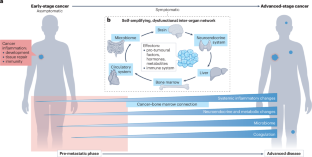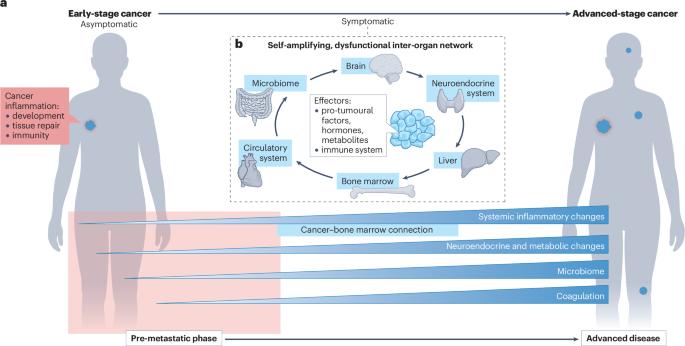Cancer-induced systemic pre-conditioning of distant organs: building a niche for metastatic cells
IF 72.5
1区 医学
Q1 ONCOLOGY
引用次数: 0
Abstract
From their early genesis, tumour cells integrate with the surrounding normal cells to form an abnormal structure that is tightly integrated with the host organism via blood and lymphatic vessels and even neural associations. Using these connections, emerging cancers send a plethora of mediators that efficiently perturb the entire organism and induce changes in distant tissues. These perturbations serendipitously favour early metastatic establishment by promoting a more favourable tissue environment (niche) that supports the persistence of disseminated tumour cells within a foreign tissue. Because the establishment of early metastatic niches represents a key limiting step for metastasis, the creation of a more suitable pre-conditioned tissue strongly enhances metastatic success. In this Review, we provide an updated view of the mechanisms and mediators of primary tumours described so far that induce a pro-metastatic conditioning of distant organs, which favours early metastatic niche formation. We reflect on the nature of cancer-induced systemic conditioning, considering that non-cancer-dependent perturbations of tissue homeostasis are also able to trigger pro-metastatic conditioning. We argue that a more holistic view of the processes catalysing metastatic progression is needed to identify preventive or therapeutic opportunities. In this Review, Rabas et al. describe the mechanisms by which primary tumours precondition distal organs to favour metastatic colonization — a limiting step of metastasis — and discuss how non-cancer-dependent perturbations of tissue homeostasis are also able to trigger pro-metastatic conditioning, emphasizing the need for a holistic view to identify preventive or therapeutic opportunities.


癌症诱导的远处器官系统性预处理:为转移细胞建立生态位
肿瘤细胞在形成初期就与周围的正常细胞结合,形成一种异常结构,并通过血液和淋巴管甚至神经联系与宿主机体紧密结合。利用这些联系,新出现的癌症会发出大量介质,有效地扰乱整个机体,并诱发远处组织的变化。这些扰动通过促进更有利的组织环境(生态位),支持扩散的肿瘤细胞在外来组织中持续存在,从而偶然地有利于早期转移的建立。由于早期转移龛的建立是转移的关键限制步骤,因此创造更合适的预处理组织可大大提高转移的成功率。在这篇综述中,我们对迄今为止描述的原发性肿瘤诱导远处器官促转移调理的机制和介质进行了更新,这些机制和介质有利于早期转移龛的形成。考虑到非癌症依赖的组织稳态扰动也能引发促转移调节,我们对癌症诱导的系统调节的性质进行了反思。我们认为,需要对催化转移进展的过程有一个更全面的认识,以确定预防或治疗机会。
本文章由计算机程序翻译,如有差异,请以英文原文为准。
求助全文
约1分钟内获得全文
求助全文
来源期刊

Nature Reviews Cancer
医学-肿瘤学
CiteScore
111.90
自引率
0.40%
发文量
97
审稿时长
6-12 weeks
期刊介绍:
Nature Reviews Cancer, a part of the Nature Reviews portfolio of journals, aims to be the premier source of reviews and commentaries for the scientific communities it serves. The correct abbreviation for abstracting and indexing purposes is Nat. Rev. Cancer. The international standard serial numbers (ISSN) for Nature Reviews Cancer are 1474-175X (print) and 1474-1768 (online). Unlike other journals, Nature Reviews Cancer does not have an external editorial board. Instead, all editorial decisions are made by a team of full-time professional editors who are PhD-level scientists. The journal publishes Research Highlights, Comments, Reviews, and Perspectives relevant to cancer researchers, ensuring that the articles reach the widest possible audience due to their broad scope.
 求助内容:
求助内容: 应助结果提醒方式:
应助结果提醒方式:


